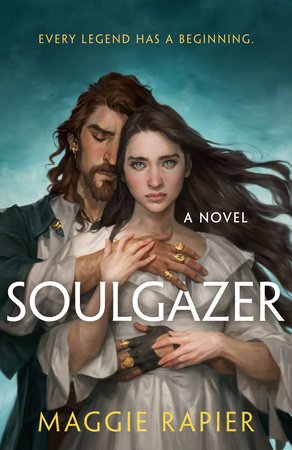A Journey of Questions: My Thoughts on Soulgazer (The Magpie and the Wolf Duology, #1)
When I first stumbled upon Soulgazer by K. E. W. McLaughlin, the allure of a tale woven with pirates and magic instantly hooked me. As a long-time fantasy lover, I often find myself enchanted by the promise of adventure on the high seas and the mysteries of otherworldly powers. However, upon diving into its pages, I found myself grappling with a whirlwind of thoughts and emotions that left me more baffled than enchanted.
From the onset, readers are plunged into a vibrant festival scene that’s meant to set the stage for an epic quest. Yet, as the narrative unfolds, it feels like I’m being led by a map with missing pieces. How can such an exciting premise come off as shallow? Despite its colorful backdrop, the essential elements are frustratingly underdeveloped. Rather than intrigue, I was left with an avalanche of questions—questions that only piled up as I trudged through nearly 500 pages of wandering plotlines.
The central character, Saoirse, as a protagonist, felt more like a frustrating puzzle than an interesting heroine. Her magical abilities, shrouded in the shadows of her abusive father’s control, should have created a compelling arc of self-discovery. Instead, for the vast majority of the story, she sidesteps her magical potential, often chastising herself for even acknowledging it. This created an incessant loop of frustration for me as a reader, wishing she would just question her father’s narratives, especially when they’re clearly fallacies!
Then there’s Faolan, supposedly the charismatic pirate whom we’re meant to root for. Yet, his early choice to give away the pivotal treasure map felt like a glaring plot hole, one that pulled me out of the story. A pirate seemingly devoid of crucial instinct? How does that work? Additionally, the romantic chemistry between him and Saoirse left me equally bewildered. It’s supposed to be a tale of newfound love, but I found their relationship to be jarring—one moment they’re stuck in a ‘fake marriage’ scenario, and the next, they’re experiencing a sudden emotional shift I just couldn’t buy into.
While I could sense that Soulgazer aimed to deliver a deeper message about freedom and self-identity, it often felt more like a collection of disjointed scenes rather than a cohesive narrative. The pacing seemed labyrinthine, with substantial parts of the timeline spent on trivial activities rather than the quest at hand. There were moments of potential brilliance—like the idea of a enchanted ship sailing into danger—but they felt overshadowed by a lack of clarity.
Reflecting on my reading experience, I can’t help but wish for another round of editing and development. The vibrant world and intriguing premise felt stifled, lacking the depth they desperately needed. Perhaps readers who enjoy whimsical fantasy with pirates and are willing to overlook contrived plot points may still find something to appreciate here, but for me, it was a tale that needed more substance and clarity.
In conclusion, while Soulgazer teases the promise of a grand adventure and immersive magic, it left me feeling unfulfilled. I would be curious to see if the sequel addresses these issues, as I still believe there’s a beautiful story waiting to be uncovered beneath the surface. If anything, my journey with Soulgazer has ignited my desire for a narrative that doesn’t just touch upon themes of self-exploration and romance, but dives deep into them with substance and finesse.
Discover more about Soulgazer (The Magpie and the Wolf Duology, #1) on GoodReads >>







